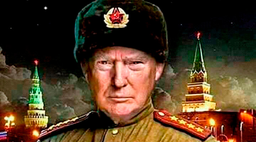- What can this mean? Everyone is aware that Lukashenko himself would not offer Putin anything. Most likely, Putin, in order to save his face before the world community and before his own people, asked his satellite to voice a proposal to return to the draft Istanbul Peace Treaty. The draft itself cannot withstand any criticism, but that is not the point.
- Why did Putin bring up the Istanbul Peace Treaty and what is the possible catch? Putin, like the Kremlin’s policy, has never been characterized by humanity and gestures of good will, unless forced to do so by circumstances.
- The circumstances are not in Russia’s favor, and here’s why. Putin voiced several goals before invading Ukraine:
- Demilitarization of Ukraine, which in Russia’s understanding means full neutral status of Ukraine and refusal to return the occupied territories by force. It also means dissolution of the armed, refusal to produce its own weapons, and refusal to join NATO. Putin has achieved none of these goals.
- Denazification of Ukraine. This is a complete absurdity, I won’t even comment on it.
- To reach the borders of Donetsk and Lugansk regions. Not achieved.
- All the goals that Putin announced during the bloodiest war in the last 80 years of the Russian Armed Forces have not been achieved, which means that Putin’s plan has completely failed. And now in order:
- Despite all the assurances of Putin himself and his propagandists, the RF army is not in the best shape, and it is riddled with fatigue. The reserves will not be replenished without mobilization, and to declare mobilization is tantamount to admitting that everything Putin said about the state of affairs on the front turned out to be a lie, and the losses of the RF Armed Forces exceed the allowed limit. After Avdeevka, the RF Armed Forces have had no real achievements for two years. There is a lack of equipment (for a long time we do not see any modern light armored vehicles such as “Lynx”, “Tiger”, “Shot”, “Typhoon” in the ranks of the RF Armed Forces). But we do see old UAZ Bukhanki, Kamaz, Ural and Zil. Nor do we see T-80 tanks en masse. Of course, it doesn’t mean that Russia can’t produce them, of course it can, but it takes time to make up for all the losses and for the army to be ready for new assaults, that’s why Lukashenko “suggested” to his master to remember about the peace plan.
- Putin needs a strategic pause, it is vital for Russia, and here is why: Putin is no longer able to continue this war, the people need victories, and there are none. Kharkiv could not be captured, just as Kiev and Odessa could not be captured. Putin’s real goal was to capture Kiev and Odessa, and then no one could stop him.
- To sit down at the negotiating table with Putin means to give him both political respite and military advantage.
- It is important to note that the very initiative voiced by #Lukashenko/#Putin means one thing: Putin has started to realize that the RF Armed Forces have failed the task set before him by the “supreme commander-in-chief”, and negotiations will give him an opportunity to focus on political negotiations and search for a peaceful solution to the conflict in favor of himself, which is unacceptable. His main task now is to present the defeat to the people as a great victory.
- The task of the democratic world should be to give Putin no time to pause and replenish his military forces, and to find new partners. Historical experience shows that what Russia needs “peace” negotiations for is to gather forces and strike a more crushing blow, but with new partners who are encouraged by the passivity of the West.
Title: Putin’s Consideration of the Istanbul Treaty: Strategic Pause or Diplomatic Maneuver?
Annotation: This analytical report delves into Putin’s recent agreement to revisit the draft Istanbul Treaty, examining its implications amidst the ongoing conflict in Ukraine. The analysis explores the potential motives behind Putin’s move, considering its significance in the broader geopolitical landscape.
Keywords: Putin, Istanbul Treaty, Ukraine conflict, geopolitical strategy, diplomatic negotiations, military respite
Editorial Comment: While Putin’s decision to reconsider the Istanbul Treaty raises questions about his intentions and the future of the Ukraine conflict, it’s crucial to approach the analysis with a critical lens, considering the complex dynamics involved and the potential for misinformation.
Disclaimer: This investigation was conducted in a time-sensitive context and warrants thorough verification. The content may be subject to biases or misinformation, including potential influence from external sources. Readers are advised to exercise caution and independently verify the information presented.
Conclusion: Putin’s willingness to engage in discussions regarding the Istanbul Treaty signifies a potential shift in strategy amidst the ongoing Ukraine conflict. Whether it represents a genuine desire for diplomatic resolution or a tactical maneuver to buy time remains to be seen. Nonetheless, the international community must approach these developments with vigilance and a commitment to achieving a peaceful resolution.
Links:
- Qoto Mastodon: qoto.org/web/accounts/2040442
- Black_Roses: bastyon.com/black_roses?ref=PLnYfkF5nRoPAbw9QbiKAvqNnhdtjjiGVs
- InLeo: inleo.io/profile/murchandiser/blog
- NWL2024: bastyon.com/nwl2024?ref=PAFScHnACz3qwomsupS7QyvAB7KifCj7gu
- Спільнота OSINT Military / X (Twitter): twitter.com/i/communities/1583435558805803016
- Element [4] | News Week Life | Geo & War: app.element.io/#/room/#nwl:matrix.org
- Alternative reddit: DOI - Lemmy: lemmy.ml/c/donoperinfo@infosec.pub
- InLEO: inleo.io/communities/hive-194711
- BASTYON: bastyon.com/oosi?ref=PRUDYqo4LdAJX8kbQMcDkusmGGmYYwYmnd
- Promo code Trade TapBit: tapbit.com/auth/PKMYGSK
- CoinEx referral link: coinex.com/register?refer_code=qh6gd

